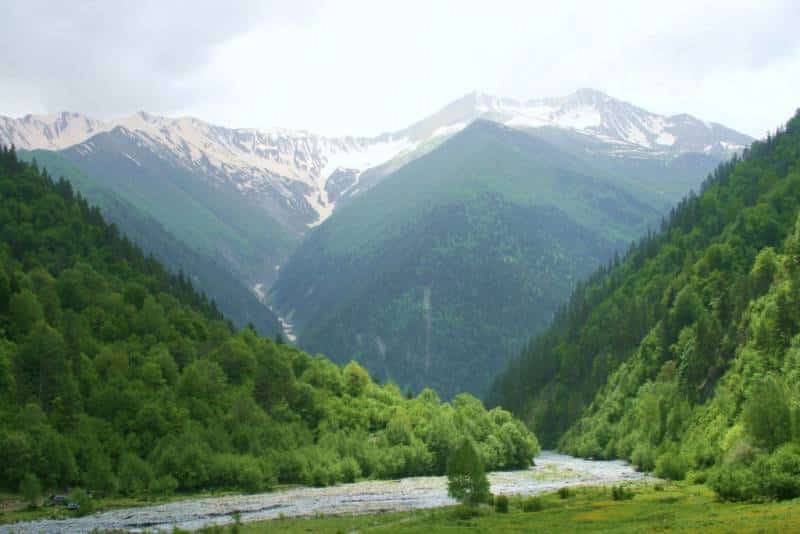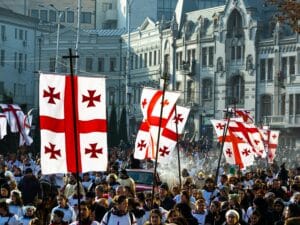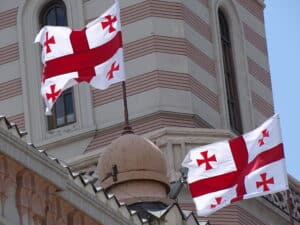The mountainous landscape of South Ossetia (source: WikiMedia Commons)
Last Sunday, April 10, a separatist northern region of Georgia – South Ossetia – organized presidential elections. None of the competitors obtained 50% or more votes, meaning a run-off vote will take place on April 24, 2022. The two remaining candidates are incumbent President Anatoly Bibilov and opposition leader Alan Gagloyev. The political landscape in South Ossetia is tightly controlled by pro-Russian politicians and cannot be regarded as free or competitive. The US, EU, and Georgia already said not to recognize the results of the election.
In the early 1990s, the region broke away from Georgia, which fought a fierce war with Russia over the territory in 2008. Following the conflict, the Kremlin recognizes South Ossetia as independent and backs it fully, militarily and financially. South Ossetian leaders have already shown their intention to organize a referendum to join Russia soon, after the 10 April elections.
No democratic opposition
In September 2020, large anti-government protests erupted in South Ossetia, following the death of a young man in police custody. During covid-19, the closed borders and full dependence on Russia caused tensions in the small region. Many called for the de facto President Anatoliy Bibilov to step down.
However, in these elections, no opposition candidates run on a protest platform. Only five candidates passed a range of obligations. The Central Election Commission denied candidates for concealment of income, or “failed” language exams. A candidate for the South Ossetian presidency must pass oral and written exams in the Ossetian and Russian languages.
Another denied candidate is former President Eduard Kokoity, who has lived in Moscow in recent years. Therefore, he is denied candidacy. Like other oppositional figures, he has called for the disruption of the election and to prevent Bibilov from winning. As said, these elections cannot be regarded as free and fair. Elections are corrupted and voting fraud takes placeregularly..
The only candidates present are opponents of Bibilov, and mostly former party members of his party ‘United Ossetia’. The main opposition candidate is Alan Gagloyev, a former KGB officer. All other opposition candidates endorsed Gagloyev for the run-off, giving him a good chance of winning the 24 April election.
A referendum in the short-term future?
In the lead-up to the presidential elections, the news is mostly dominated by the intention of current President Bibilov to organize a referendum that will merge South Ossetia into Russia. Both Bibilov and Parliament Speaker Tadtayev said that it should take place somewhere this spring. “We will take the relevant legislative steps shortly,” Bibilov told to pro-Russian agency TASS. He intends to re-unite SouthOssetia into a new Russian region, called Ossetia-Alania.
Georgian authorities reacted appalled to Bibilov’s statements. “It is unacceptable to discuss any referendums while Georgia’s territory is occupied by Russia,” Foreign Minister David Zalkaliani told on March 31. “No referendum will have any legal force amid the occupation, especially against the backdrop of hundreds of thousands of our citizens being expelled from their homes as a result of the ethnic cleansing and not being allowed to return.”
Will Russia change its stance?
Until now, Russia has denied repeated requests from South Ossetia to join its territory. However, in the light of its invasion of Ukraine, it could be different now. South Ossetia has already sent troops to Ukraine to support Russian forces.
Putin’s Kremlin spokesperson Dmitry Peskov said on 31 March that he does not voice a position on the referendum. “We haven’t taken any legal or other action in this regard. But at the same time, in this case, we’re talking about the people of South Ossetia expressing their opinion, and we respect that.”
The Kremlin has repeatedly used its control over South Ossetia as leverage over Georgia. Amid the invasion, Georgian authorities have been careful in their wording. They were slow to condemn the invasion and do not join sanctions, to the anger of the Georgian population, which protested in mass.
In reaction, Russia’s Georgian envoy Grigoriy Karasin on March 24 acclaimed Tbilisi’s “balanced” reaction to the invasion and told that “it would not go unnoticed” in Russia. The Kremlin’s stance on the referendum will be crucial for it to proceed. Time will tell whether Russia intends to change its posture towards Georgia, or whether it will continue current policies in South Ossetia.
Sources: Eurasianet Washington Post Gorchakov Fund Knkx Civil.ge JAM News I JAM News II
Photo: WikiMedia Commons



